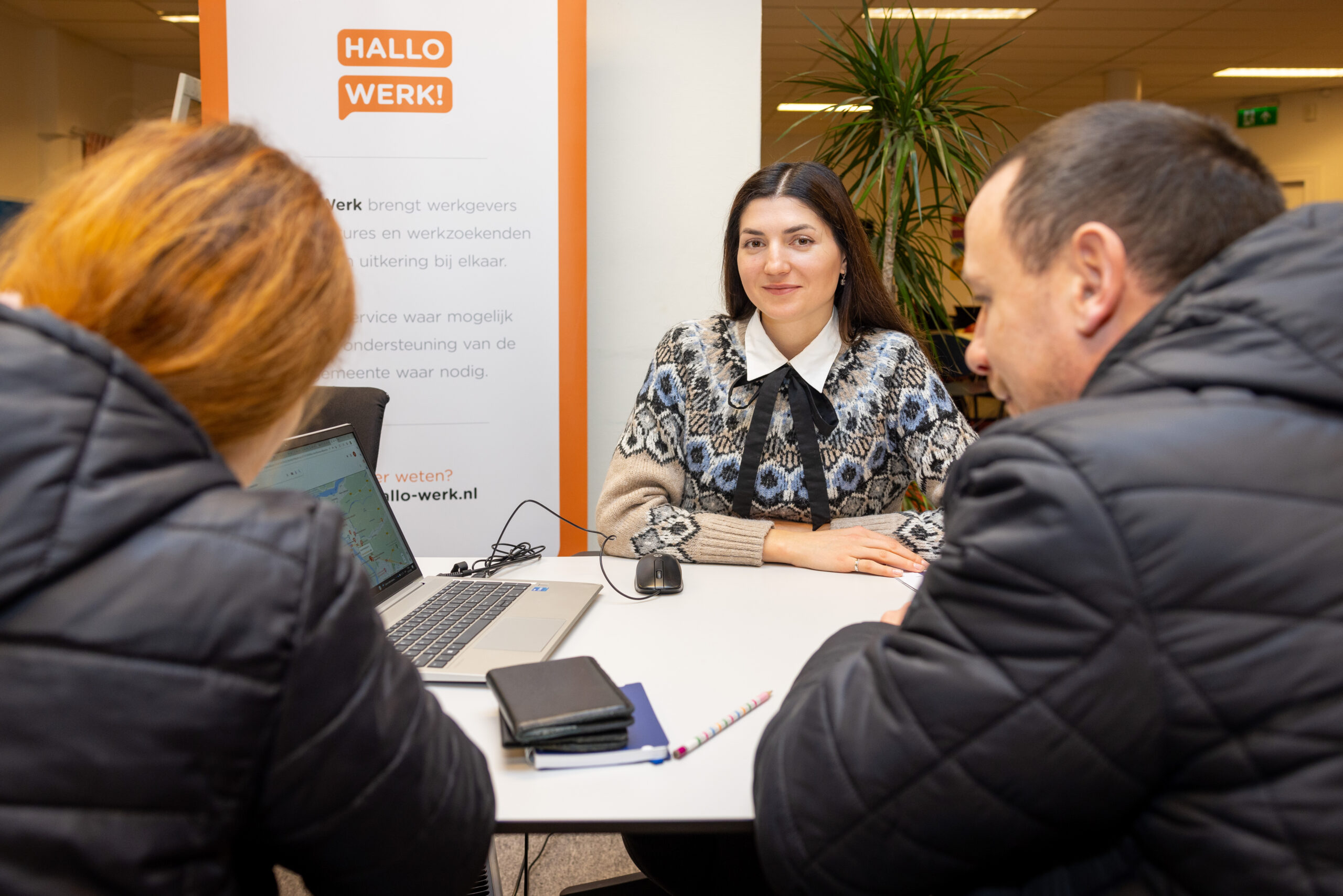‘Door mijn werk help ik mijn landgenoten’
De Oekraiense Roksolana is communicatief, zorgzaam en spreekt goed Engels. Ze ging met twee Oekraiense dames mee naar HalloWerk om ze te helpen bij hun gesprek. Voor ze het wist had ze zelf een baan, als vertaler. Een toevalstreffer. Maar wel helemaal raak.

Foto: Gemaakt door Rhalda Jansen
Roksolana is nu 7 maanden in Nederland. “Ik liet mijn moeder en mijn vrienden achter in Oekraïne. Maar voor mij was het beter om te vluchten. Ik kreeg zoveel stress van de oorlog, van het idee dat we 24 uur per dag in gevaar waren, dat ik niet meer sliep. Mijn hoofd stond niet meer stil. Dat gaat nu gelukkig beter. Al mis ik mijn vrienden en familie enorm.”
Aan de slag
Na aankomst in Rotterdam nam ze even de tijd om te settelen en haar ervaringen te verwerken. En net toen ze op zoek wilde gaan naar een baan, sloeg het toeval toe. “Ik ging me inschrijven bij HalloWerk en hoorde twee vrouwen naast me in het Oekraiens zeggen dat ze opzagen tegen hun gesprek. Ze spraken geen Engels en daar werden ze erg onzeker van. Ik bood aan om met ze mee naar binnen te gaan en ze te helpen. Dat ging zó goed dat de mensen van HalloWerk vroegen of ik aan de slag wilde als vertaler! Maar ik werd meer dan alleen een vertaler. Net als de ´gewone’ HalloWerk-coaches help ik kandidaten met hun profiel. Ik heb contact met werkgevers om een goede match te maken tussen hen en onze kandidaten. En ik help om de job-fairs te organiseren.”
Gewoon luisteren
Roksolana werkt nu vier dagen in de week in het Oekraiens Huis, in Rotterdam-Zuid. “Ik help mensen die binnenlopen met hun cv of beantwoord vragen die ze hebben over werken in Nederland en over allerlei regelingen. Het is belangrijk dat ze geholpen worden, maar óók dat er gewoon naar ze geluisterd wordt. Dat ze hun verhaal kunnen doen in hun eigen taal.”
Hoewel er dus ondersteuning in het Oekraiens is, adviseert Roksolana haar landgenoten om zo snel mogelijk Nederlands of minstens Engels te leren. “Natuurlijk moet je de tijd nemen om te wennen, om je trauma’s te verwerken. Maar zodra het kan, ga aan de slag met de taal. Anders kun je nauwelijks werk vinden. Je moet met je collega’s kunnen communiceren, instructies kunnen volgen… Mensen in Nederland willen je graag helpen. Ik heb zoveel vriendelijkheid ontmoet sinds ik hier ben, dat is onvoorstelbaar! Maar ze moeten je wel kunnen begrijpen.”
Ook Roksolana leerde Nederlands. “Eerst van een vrijwilliger en toen online. Maar ik praat het nog niet goed genoeg. Je moet het oefenen, en hier praat ik natuurlijk veel Oekraiens. Dat is juist mijn werk. En dat is ook mooi. Weet je, ik kan niet vechten in de oorlog. Maar door mijn werk hier kan ik toch nog iets doen om mijn land en mijn landgenoten te helpen.”
Meer weten over HalloWerk? Kijk op HalloWerk
‘Through my work I help my compatriots’
The Ukrainian Roksolana is communicative, caring and speaks good English. She went to HalloWerk with two Ukrainian ladies to help them with their conversation. Before she knew it she had a job herself, as a translator. A coincidence. But a really fitting one.
Roksolana has been in the Netherlands for 7 months now. “I left my mother and my friends in Ukraine. But for me it was better to run. I got so stressed out from the war, from the idea that we were in danger 24 hours a day, that I couldn’t sleep anymore. My brain could not stop moving. Fortunately, that is better now. Although I miss my friends and family very much.”
To work
After arriving in Rotterdam, she took some time to settle down and process her experiences. And just as she was about to start looking for a job, chance struck. “I went to register with HalloWerk and heard two women next to me say in Ukrainian that they dreaded their interview. They didn’t speak English and that made them very insecure. I offered to go in with them and help them. That went so well that the people from HalloWerk asked if I wanted to work as a translator! But I became more than just a translator. Just like the ‘regular’ HalloWerk coaches, I help candidates with their profile. I am in contact with employers to make a good match between them and our candidates. And I help organize the job fairs.”
Just listen
Roksolana now works four days a week in the Oekraiens Huis, in South Rotterdam. “I help people who come in with their CV or answer questions they have about working in the Netherlands and about all kinds of regulations. It is important that they are helped, but also that they are simply listened to. That they can tell their story in their own language.”
Although there is support in Ukrainian, Roksolana advises her compatriots to learn Dutch or at least English as soon as possible. “Of course you have to take the time to get used here, to process your traumas. But as soon as you can, get started with the language. Otherwise you can hardly find any work. You must be able to communicate with your colleagues, follow instructions… People in the Netherlands are happy to help you. I’ve met so much kindness since I’ve been here, it’s unimaginable! But they must be able to understand you.”
Roksolana also learned Dutch. “First from a volunteer and then online. But I still don’t speak it well enough. You have to practice it, and of course I speak a lot of Ukrainian here. That’s exactly my job. And that’s nice too. You know, I can’t fight in the war. But because of my work here, I can still do something to help my country and my compatriots.”

